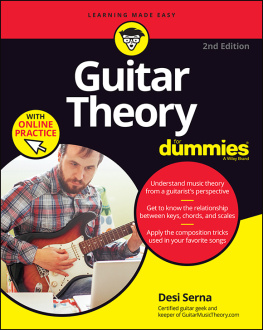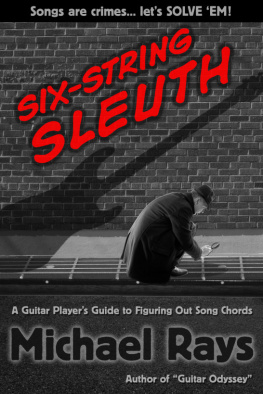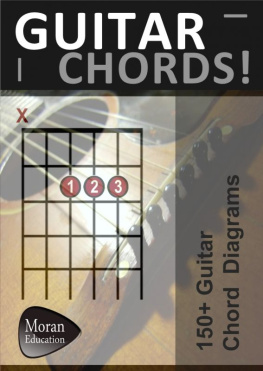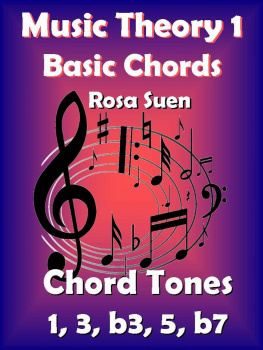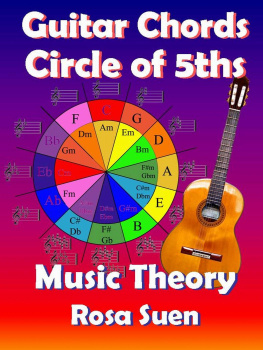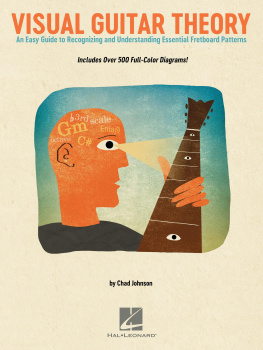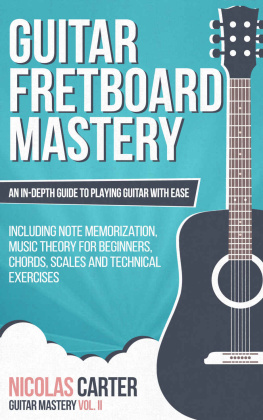Bobby Kitteberger - Music Theory for Guitar Players in Plain English: An In-Depth Guide to Scales, Chords and the Fretboard
Here you can read online Bobby Kitteberger - Music Theory for Guitar Players in Plain English: An In-Depth Guide to Scales, Chords and the Fretboard full text of the book (entire story) in english for free. Download pdf and epub, get meaning, cover and reviews about this ebook. year: 2016, publisher: UNKNOWN, genre: Children. Description of the work, (preface) as well as reviews are available. Best literature library LitArk.com created for fans of good reading and offers a wide selection of genres:
Romance novel
Science fiction
Adventure
Detective
Science
History
Home and family
Prose
Art
Politics
Computer
Non-fiction
Religion
Business
Children
Humor
Choose a favorite category and find really read worthwhile books. Enjoy immersion in the world of imagination, feel the emotions of the characters or learn something new for yourself, make an fascinating discovery.

- Book:Music Theory for Guitar Players in Plain English: An In-Depth Guide to Scales, Chords and the Fretboard
- Author:
- Publisher:UNKNOWN
- Genre:
- Year:2016
- Rating:4 / 5
- Favourites:Add to favourites
- Your mark:
- 80
- 1
- 2
- 3
- 4
- 5
Music Theory for Guitar Players in Plain English: An In-Depth Guide to Scales, Chords and the Fretboard: summary, description and annotation
We offer to read an annotation, description, summary or preface (depends on what the author of the book "Music Theory for Guitar Players in Plain English: An In-Depth Guide to Scales, Chords and the Fretboard" wrote himself). If you haven't found the necessary information about the book — write in the comments, we will try to find it.
Bobby Kitteberger: author's other books
Who wrote Music Theory for Guitar Players in Plain English: An In-Depth Guide to Scales, Chords and the Fretboard? Find out the surname, the name of the author of the book and a list of all author's works by series.
Music Theory for Guitar Players in Plain English: An In-Depth Guide to Scales, Chords and the Fretboard — read online for free the complete book (whole text) full work
Below is the text of the book, divided by pages. System saving the place of the last page read, allows you to conveniently read the book "Music Theory for Guitar Players in Plain English: An In-Depth Guide to Scales, Chords and the Fretboard" online for free, without having to search again every time where you left off. Put a bookmark, and you can go to the page where you finished reading at any time.
Font size:
Interval:
Bookmark:
MUSIC THEORY FOR GUITAR PLAYERS
in plain English
An in-depth guide to scales, chords and the fretboard
B y BOBBY KITTLEBERGER
GUITAR CHALK
Copyright 2016 Guitar Chalk
All rights reserved.
ISBN: 1537170236
ISBN-13: 978-1537170237
for more content
Check out guitarchalk.com/blog
TABLE OF CONTENTS
SECTION I: Why Music Theory Matters | ||
SECTION II: What is a note? | ||
SECTION III: Crucial Theory Vocabulary | ||
SECTION IV: Understanding Sheet Music | ||
SECTION V: Understanding Intervals | ||
SECTION VI: Basic Chords & Chord Types | ||
SECTION VII: Understanding Scales | ||
SECTION VIII: Conclusion |
Introduction
I believe there are two misconceptions about music theory that ought to be dispelled. First, that music theory is inherently difficult and unlearnable for the average joe who just wants to pick up a guitar and play.
Music theory isnt a burdensome nuisance that aspiring guitarists need to put up with.
Rather, its a helpful structure that provides clarity and a greater chance of success, not just with the guitar, but in music as a whole.
The second misconception, is that music theory is not necessary to learn.
While it might be true that you can skirt by on little or no theory and still be a strong fretboardist, you will never truly know and understand why youre playing what youre playing without a firm knowledge of music theory. I would argue that theory is fundamental to the guitar, even critical.
Yet, Im not here to tell you that you must read sheet music, understand the full breadth of what it means to compose, or be capable of acing formal music theory courses.
If that were the goal, I myself would be woefully inadequate to write this book.
Because Im not a theory guru or a classically trained musician. And the good news is that you dont have to be either.
The goal is not to be a master of music theory, but instead to learn the basic tenets of theory that directly apply to the guitar.
And whats even better news, is that we can learn those tenants fairly quickly using plain English thats easy to understand and to put into practice. By the time youre done with this book youll know theory and, more importantly, youll know music.
Further, youll be in a position to apply it to the guitar. As a pleasant side effect, the fretboard will make more sense to you as a helpful grid, instead of a confusing challenge.
I sincerely hope you enjoy the process.
Robert Bobby Kittleberger
SECTION I:
WHY MUSIC THEORY MATTERS
I dont know anything about music theory at all. Zero. - Amos Lee
Guitar players, and many guitar teachers, are quick to dismiss music theory.
Their reasons will vary. Some believe it isnt necessary or helpful. Others find it too difficult or not as relevant to the guitar as it might be to other instruments, like the piano.
Even many of musics most renowned contributors have commonly minimized the discipline of learning theory or music as a whole.
Take the king of rock and roll himself, Elvis Presley:
I dont know anything about music. In my line, you dont have to. - Elvis Presley
Frank Zappa offers a far more unfavorable view of what it means to compose:
A composer is a guy who goes around forcing his will on unsuspecting air molecules, often with the assistance of unsuspecting musicians. - Frank Zappa
While this is certainly not the view of all musicians, theres an oddly pervasive sentiment that music theory is stifling and obstructive; that its antithetical to musical freedom and creative expression.
This sentiment often causes aspiring guitarists to avoid music theory all together. Because, in the world of the arts, what seems rigid and academic will always lose ground to what is said to be freeform and unbounded.
Thus the music world at large, and its lean towards free, artistic expression, has in many instances, been prone to minimize music theory and downplay the value of musical structures. This has contributed to the idea that music theory isnt necessary outside of formal education.
Even if you get into the realm of classical composition.
Claude Debussy, a renowned French composer, put it this way:
There is no theory. You have only to listen. Pleasure is the law. I love music passionately. And because I love it, I try to free it from the barren traditions that stifle it. It is a free art gushing forth, an open air art, boundless as the elements, the wind, the sky, the sea. It must never be shut in and become an academic art.
Debussy obviously had a love-hate relationship with music theory.
While one could empathize with the sentiment of what Debussy is saying, its difficult to agree with, or accept the implications of, this view of music for a couple of reasons.
First, there certainly is theory. In fact, music means nothing to us without it.
Second, music theory and barren traditions are not one in the same. Traditions, in and of themselves can be good or bad. They are fluid, highly subjective trends that depend on ones culture, skill level and stylistic leanings.
Boiling theory down to simple tradition and equating the two is intellectually simplistic and a bit irresponsible.
While music is certainly free and expressive, it is most optimally expressed within the structural confines of music theory.
Theory supersedes tradition and has input into every type and style of music, regardless of how creative (or uninspired) it might be.
Throwing off the academic aspects of music does both the teacher and the student a disservice. While music is certainly free and expressive, it is most optimally expressed within the structural confines of music theory.
In other words, music is variety within structure , which Debussy, if he were more aware of his own analogy, would know that the elements are as well. The sea, the sky and the wind are extremely varied, yet they exist and function within a well-established scientific structure and creative order.
Furthermore, the structure that music theory provides is far larger than the expanse of our own creativity, which is often severely limited by style, preference and abilities.
In other words, theory provides the foundation for your ideas to naturally flow. Thus, the most powerful argument for needing to know music theory is that it provides governing borders that supports our creativity. They are one anothers strongest allies.
I would also add that there is a lot of music theory that guitar players dont need to know, simply because it is not directly applicable to our instrument.
Many lanes of music theory are vast, complex and even mathematical. Therefore its not necessary (or even productive) that we be experts in all of these facets. In this book, Ill show you what portions of theory are worthy of your attention and most relevant to your instrument of choice - the guitar.
This will benefit you primarily in three ways:
- It will help you put words (definitions) and correct terminology behind simple musical concepts and structures.
- It will allow you to more effectively converse and collaborate with musicians who are formally educated in music.
- It will help you understand music as a whole , as opposed to guitar as a single entity.
One of the primary goals of our musicianship, and our guitar playing, should be the third item in this list. We need to understand music , not just our guitar. If we glean a comprehensive understanding of music and composition, then what happens on the fretboard will make more sense to us.
Next pageFont size:
Interval:
Bookmark:
Similar books «Music Theory for Guitar Players in Plain English: An In-Depth Guide to Scales, Chords and the Fretboard»
Look at similar books to Music Theory for Guitar Players in Plain English: An In-Depth Guide to Scales, Chords and the Fretboard. We have selected literature similar in name and meaning in the hope of providing readers with more options to find new, interesting, not yet read works.
Discussion, reviews of the book Music Theory for Guitar Players in Plain English: An In-Depth Guide to Scales, Chords and the Fretboard and just readers' own opinions. Leave your comments, write what you think about the work, its meaning or the main characters. Specify what exactly you liked and what you didn't like, and why you think so.

